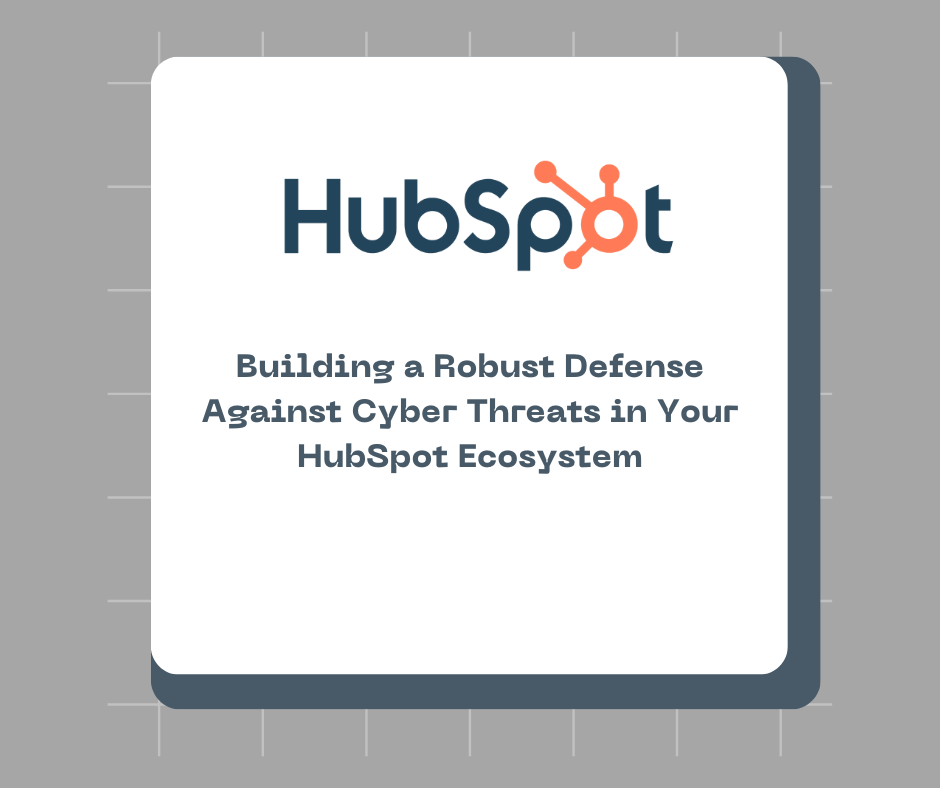In today's digital age, where businesses rely heavily on technology for their operations, the threat of cyber attacks looms large. With valuable data stored and processed within systems like HubSpot, it's crucial for businesses to prioritize cybersecurity to protect sensitive information and maintain the trust of their customers. In this article, we'll explore the importance of building a robust defense against cyber threats in your HubSpot ecosystem and provide actionable steps to enhance your cybersecurity posture.
Understanding the Risks
Before diving into defense strategies, it's essential to understand the risks associated with operating within the HubSpot ecosystem. As a comprehensive marketing, sales, and customer service platform, HubSpot houses a wealth of valuable data, including customer contact information, marketing campaigns, sales pipelines, and more. This makes it an attractive target for cybercriminals seeking to exploit vulnerabilities and gain unauthorized access to sensitive information.
Common cyber threats that businesses face within their HubSpot ecosystem include:
-
Phishing Attacks: Cybercriminals may attempt to trick users into revealing login credentials or sensitive information through deceptive emails or messages.
-
Data Breaches: Unauthorized access to HubSpot accounts or databases can result in the theft of sensitive customer data, leading to reputational damage and financial loss.
-
Malware and Ransomware: Malicious software can infect systems within the HubSpot ecosystem, encrypting data or disrupting operations until a ransom is paid.
-
Account Takeovers: Weak passwords or compromised credentials can allow attackers to gain control of HubSpot accounts, enabling them to manipulate data or launch further attacks.
Strengthening Your Defense
To mitigate these risks and build a robust defense against cyber threats in your HubSpot ecosystem, consider implementing the following strategies:
1. Employee Training and Awareness
Invest in comprehensive cybersecurity training programs to educate employees about the risks of cyber threats and best practices for preventing attacks. Emphasize the importance of strong password management, recognizing phishing attempts, and following security protocols when accessing HubSpot accounts or sensitive data.
2. Secure Authentication Practices
Enforce strong authentication mechanisms, such as multi-factor authentication (MFA), to add an extra layer of security to HubSpot accounts. Require employees to verify their identity through multiple factors, such as a password and a one-time code sent to their mobile device, before accessing sensitive information.
3. Regular Security Updates and Patches
Stay vigilant about applying security updates and patches to all systems and software within your HubSpot ecosystem. Regularly check for updates released by HubSpot and other third-party integrations to address known vulnerabilities and strengthen defenses against emerging threats.
4. Data Encryption
Implement robust encryption protocols to protect data stored and transmitted within the HubSpot ecosystem. Encrypt sensitive information such as customer data, login credentials, and communications to prevent unauthorized access in the event of a breach.
5. Access Control and Privilege Management
Adopt strict access control measures to limit user permissions within the HubSpot platform based on the principle of least privilege. Grant access only to employees who require it to perform their job duties and regularly review and revoke access for inactive or former employees.
6. Endpoint Security
Deploy endpoint security solutions, such as antivirus software and intrusion detection systems, to safeguard devices used to access the HubSpot ecosystem. Monitor and secure endpoints against malware, ransomware, and other malicious threats that could compromise sensitive data.
7. Incident Response Plan
Develop a comprehensive incident response plan outlining the steps to take in the event of a cyber attack or data breach within the HubSpot ecosystem. Define roles and responsibilities, establish communication protocols, and conduct regular tabletop exercises to ensure a coordinated and effective response.
8. Regular Security Audits and Assessments
Conduct regular security audits and assessments of your HubSpot ecosystem to identify vulnerabilities and weaknesses that could be exploited by cybercriminals. Collaborate with cybersecurity professionals to perform penetration testing, vulnerability scanning, and risk assessments to proactively address security gaps.
Conclusion
In an increasingly interconnected and digitized world, protecting your HubSpot ecosystem from cyber threats is paramount to safeguarding sensitive data and maintaining the trust of your customers. By implementing robust defense strategies, such as employee training, secure authentication practices, regular security updates, and incident response planning, businesses can strengthen their cybersecurity posture and mitigate the risks of cyber attacks. Remember, cybersecurity is an ongoing process that requires vigilance, adaptability, and collaboration across all levels of the organization. By prioritizing cybersecurity within your HubSpot ecosystem, you can effectively defend against threats and ensure the continued success and security of your business.
Schedule your training session here and comment “Need Training” on the request form.

Comments